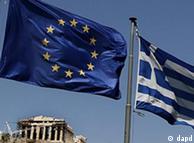ECONOMY | 25.07.2011
Greece's second bailout could send wrong signal, experts warn
The decision to provide Greece with a second massive economic bailout in just over a year has weakened the incentive among European states to maintain sound fiscal policies, according to Jens Weidmann, president of Germany's central bank.
He warned over the weekend that Europe risked turning into a transfer union in which the citizens of economically productive states carry the burdens of countries that have made irresponsible economic decisions.
"The eurozone has taken a major step toward collectivizing risks when states with weak finances make poor macroeconomic decisions, thereby transferring extensive additional risks to the tax payers of nations forced to provide the aid money," Weidmann said.
Lorenzo Bini Smaghi, a member of the European Central Bank's executive board, criticized the debate about restructuring Greece's 350 billion euro ($503 billion) debt, arguing that it had raised the risk of a contagion within the eurozone and weakened the common currency.
 Deutsche Bank was reportedly prepared to contribute more to Greece's bailout"That's the reason why the decision has to remain an exceptional case," Smaghi told the weekend edition of the daily Die Welt. "We shouldn't act as if this deal with Greece did not come at a cost."
Deutsche Bank was reportedly prepared to contribute more to Greece's bailout"That's the reason why the decision has to remain an exceptional case," Smaghi told the weekend edition of the daily Die Welt. "We shouldn't act as if this deal with Greece did not come at a cost." The eurozone's 17 member states agreed on Thursday to lend Greece an additional 109 billion euros while private banks and financial institutions announced they would make a voluntary contribution of around 50 billion euros. Athens had already been promised a bailout package of 110 billion euros last spring.
'Long way to go'
German banks, meanwhile, had apparently been ready to make a larger contribution than ultimately demanded of them. Deutsche Bank was prepared to write off 50 percent of the value on its Greek bonds while Commerzbank and the insurance company Allianz had suggested 30 percent, according to the German newspaper Welt am Sonntag.
The eurozone heads of state ultimately agreed to cut Greece's debt by 21 percent, well below the number floated by many creditors. In total, German financial institutions hold approximately 4.5 billion euros in Greek bonds and are set to lose around 945 million euros as a consequence of the 21 percent write off.
Thursday's bailout deal also moved the eurozone closer toward a fiscal union in which Brussels would have greater powers to review and influence the economic policies of the nations who have adopted the euro currency.
But according to Greek President Karolos Papoulias, Europe still has its work cut out for it.
"After a long delay we have taken a step towards European integration, but there is still a long way to go," Papoulias said.
Author: Spencer Kimball (dpa, dapd)
Editor: Andreas Illmer
Editor: Andreas Illmer
dw


No comments:
Post a Comment